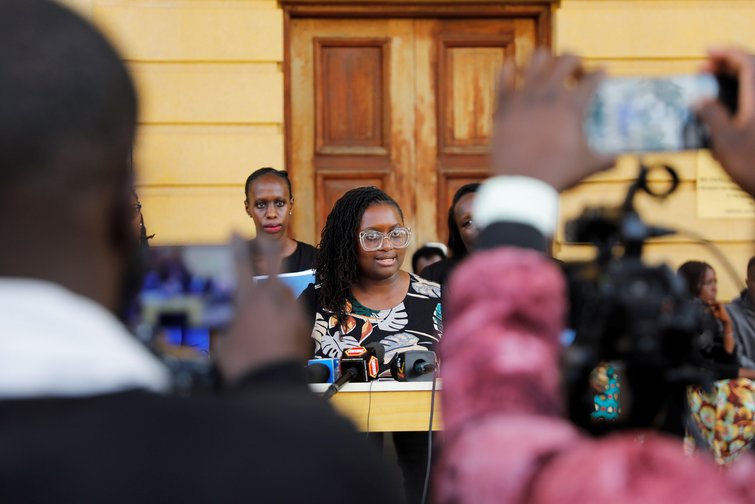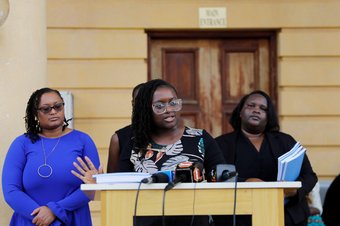A lawsuit alleges forced labour, human trafficking and union busting in Facebook’s content moderation hub in Nairobi
Mukanzi Musanga
7 February 2023

Mercy Mutemi, a lawyer representing a former content moderator, after filing a lawsuit against Facebook owner Meta Platforms Inc and its local content moderation contractor Sama, in May 2022 |
REUTERS
A Kenyan court has ruled against Meta’s attempt to have its name struck off a lawsuit that alleges forced labour, human trafficking and union busting in Facebook’s content moderation hub in Nairobi.
Facebook’s parent company had sought to be removed from the case, which is brought by former Facebook content moderator, Daniel Motaung. The tech giant argued that it cannot be sued in Kenya because it is not registered there.
In a ruling on Monday, Jacob Gakeri Kariuki, the presiding judge at the Nairobi Employment and Labour Relations Court, ruled that Meta is a “proper party” to the case.
The court proceedings will now move to the next stage, with Motaung’s legal team expected to file another application to serve Meta’s US headquarters with Kenyan legal papers, before the hearing of courtroom arguments can start. The next court session is scheduled for 8 March.
In May 2022, Motaung, a former content moderator at Facebook, sued the social media company and its outsourcing contractor, Samasource Kenya EPZ Ltd, for a raft of alleged workers’ rights violations, including exploitation, union busting and pay discrimination.
The South African whistleblower said that while working to moderate Facebook content, he not was not only exposed to depictions of violence that made him mentally ill but was also poorly paid and fired by Sama when he tried to unionise his colleagues. In the suit, he wants Meta to reform how it handles content moderation in Africa, arguing that the current approach is “exploitative” and harms workers.
The judge directed all parties in the case to not speak about it publicly. Sama announced earlier this year that it would not renew its contract with Meta when it ends next month. Analysts have argued that the case could set an important precedent for African governments wanting to hold Big Tech firms, which are often domiciled in the West and have deeper pockets than entire nations on the continent, accountable.
Leah Kimathi of the Council for Responsible Social Media, a Kenyan non-profit, told openDemocracy that the court’s ruling was “vindication and a validation of what Kenyans demand – that the government must defend their digital dignity and protect them from social media harm”.
She added that Facebook’s refusal of accountability of its operations in Kenya was reminiscent of the exploitative African colonial project that was “premised on extracting profits from Kenya with no (or minimal) investments and that would enable them to extract profits. It’s what big tech is doing in Africa”.
“When Meta challenges that the Kenya government does not have jurisdiction over their operations in Kenya, it's condescending and reminds us of the colonial project and its very exploitative nature. It felt like the subjugation of Africa once again,” said Kimathi, adding that yesterday’s decision was an emancipatory one.
London-based tech justice legal non-profit, Foxglove, which is supporting Motaung and The Signals Network, an international whistleblowers collective, also celebrated the court’s decision. The executive director of Amnesty International Kenya, in a joint statement with other organisations, said that the ruling “should send a message to Facebook, and by proxy, to all Big Tech in Africa. Kenyan justice is equal to any tech giant”.
In a separate case, Meta is being sued in Kenya allegedly for failing to moderate Facebook content that stirred hate attacks during Ethiopia’s war in Tigray. In a December interview with openDemocracy, one claimant said he holds Facebook and Mark Zuckerberg directly responsible for his father’s death.
Related story

Facebook lawsuit in Kenya could affect Big Tech accountability across Africa
12 August 2022 | Nanjira Sambuli
It’s time for the social media giants to stop exploiting and traumatising low-wage workers in Africa
No comments:
Post a Comment